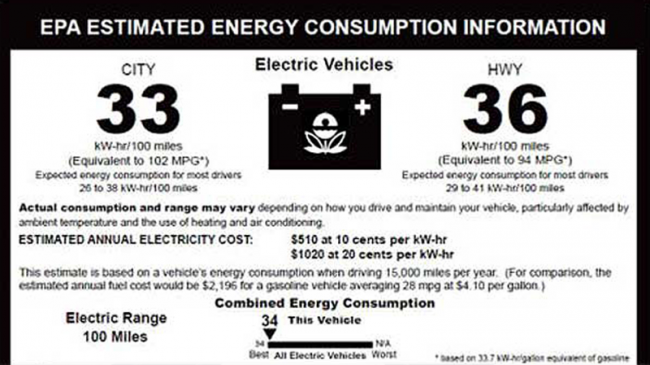New vehicles sold in the U.S. must comply with increasingly stringent Corporate Average Fuel Economy (CAFE) standards. Originally intended to reduce reliance on oil imports, the new standards focus mainly on reducing emissions of greenhouse gases. But even the federal government’s own studies show that CAFE standards are an extremely costly and inefficient means of achieving these objectives. In a review now under way, the Trump administration has an opportunity to reduce these costs by leaving the standards unchanged after 2021.
In 2012, the National Highway Transportation and Safety Administration (NHTSA) and the Environmental Protection Agency (EPA) issued new CAFE standards for vehicles manufactured in the years 2017-2025. Under these rules, the minimum fleet wide average fuel economy for passenger cars would rise from 39.6 mpg this year to 55.3 mpg in 2025. For light trucks, minimum fuel economy would rise from 29.1 mpg this year to 39.3 mpg in 2025.
Final rules were only set for model years 2017-21, with subsequent rules to be established after a mid-term evaluation. In that evaluation, EPA and NHTSA found that between 2016 and 2028 the standards would reduce total carbon dioxide emissions by up to 748 million metric tons. In its regulatory impact assessment of the new CAFE standards, NHTSA estimated the annualized cost of implementation at between $5.4 billion and $7.6 billion. Even at that low end — $5.4 billion per year — the CAFE standards represent an implicit cost of $87 per ton of carbon dioxide (CO2) reduced. That is higher than most estimates of the cost that carbon dioxide imposes on society – and more than twice the EPA’s own estimate (since withdrawn by President Trump).
Additionally, these estimates almost certainly overstate the benefit of the new fuel economy standards and underestimate their costs. When consumers buy more fuel efficient cars, they typically drive more because their per-mile cost of driving is lower. And many other consumers prefer large, powerful vehicles. Because the new CAFE standards drive up the cost of new large vehicles disproportionately, consumer demand for older, large “gas guzzlers” rises and those vehicles stay on the road longer than they might otherwise. In combination, these two factors could reduce the effectiveness of CAFE standards by as much as one-half of EPA and NHTSA’s estimates.
Even assuming a more modest total effect, the new CAFE standards might optimistically reduce CO2 emissions by around 50 million metric tons per year, which equals just one percent of total U.S. emissions.
Researchers at the Heritage Foundation found that the costs of meeting the new CAFE standards could range from $61.2 billion to $186.1 billion per year. The higher figure represents approximately 1 percent of U.S. GDP – a staggering cost. If the true cost of the new CAFE standards is even $50 billion per year and the true emissions savings were as much as 50 million metric tons a year, CAFE standards would represent an implicit cost of $1,000 per ton of CO2 reduced – making them among the least efficient ways to reduce CO2 emissions.
CAFE standards distort the market, forcing companies to build vehicles that are more fuel-efficient than consumers want. When consumers purchase these more-expensive-than-necessary vehicles, they have fewer resources to invest in other things, including conservation and other practical environmental improvements. Moreover, companies forced to invest in the development of more fuel-efficient vehicles have fewer funds to invest in more useful innovations, such as the development of autonomous vehicles, which are likely to save fuel and reduce emissions and traffic congestion.
NHTSA recently announced plans to prepare an environmental impact statement for CAFE standards for model years 2022-2025. One of the options under consideration is to keep the fuel economy standards at the levels set for the model year 2021. Doing so would reduce market distortions, save consumers billions of dollars, and enable companies to invest more in the development of improvements that actually benefit consumers and the environment.

